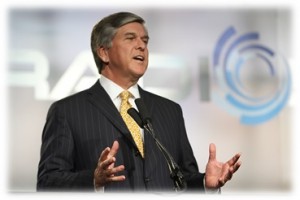The NextRadio initiative has both supporters and detractors. But there’s no question that whether it turns out to be radio’s salvation, a bust, or simply a convenient way for some smartphone users to access their favorite local stations, it is a bold step for radio to take.
One of the interesting aspects of NextRadio is that it represents a departure from the radio broadcasting industry’s earlier efforts to mandate a chip in smartphones sold in America. You may remember how that idea created something of a flap, inspiring the Consumer Electronics Association’s CEO Gary Shapiro to brand broadcasting as “a buggy whip industry.”
 Yet, following The Radio Show last month, there was renewed talk about convincing Congress to require wireless companies to fire up those FM chips in smartphones. Last week, the NAB’s Gordon Smith told Inside Radio that these efforts will be more about education rather than about lobbying for a mandate. Noting there’s a lot of “ideological resistance” to requiring companies like Verizon, AT&T, and T-Mobile to force this issue, Smith indicated that the NAB isn’t committing any resources to this idea.
Yet, following The Radio Show last month, there was renewed talk about convincing Congress to require wireless companies to fire up those FM chips in smartphones. Last week, the NAB’s Gordon Smith told Inside Radio that these efforts will be more about education rather than about lobbying for a mandate. Noting there’s a lot of “ideological resistance” to requiring companies like Verizon, AT&T, and T-Mobile to force this issue, Smith indicated that the NAB isn’t committing any resources to this idea.
But it was Smith’s response about his letter to BMW’s North America president/CEO Ludwig Willisch about the exclusion of AM radio technology in its i3 and i8 electronic models that should cause you to pause and think about radio broadcasting’s game plan as it pertains to the “connected cars” rolling off assembly lines all over the world:
“I got a very nice letter back (from Willisch) and it just simply explained that for these particular models of electrics, it was an interference issue that they had not been able to resolve to their satisfaction. Other manufacturers that produce electric cars have [resolved the interference issue] but BMW said that was the reason they weren’t including AM in their electric vehicles. That’s the sum and substance of the letter. It was a very nice letter and they’re very committed to radio but it was just unique to their electric car and the interference that was created on the AM band from that motor that caused them to leave it out.”
The radio broadcasting brain trust needs to do more than dash off letters of protest to automakers – after key decisions have already been made. When it comes to connecting, collaborating, and partnerships with the car companies, broadcast radio needs to develop strategies and action plans so that policies, lines of communication, and marketing efforts can be discussed and coordinated. It may be a dead end lobbying with Congress to mandate those FM chips, but working closely with the OEMs and their Tier 1 suppliers on issues involving the “center stack” has to become a higher priority for radio.
You can bet that I’ll ask Gary Shapiro about CES, the auto industry, radio broadcasting, and the FM chip when we sit down to chat next week on stage in front of a couple hundred enthusiastic attendees from both the radio and automotive sectors. And I’ll bet he’ll have an opinion…or three.
See you at DASH.
- Media And Technology In 2025: Believe It Or Not! - April 18, 2025
- In Radio, You Just Never Know - April 17, 2025
- The Secret To Making A Great Podcast (And Great Radio) - April 16, 2025




Leave a Reply